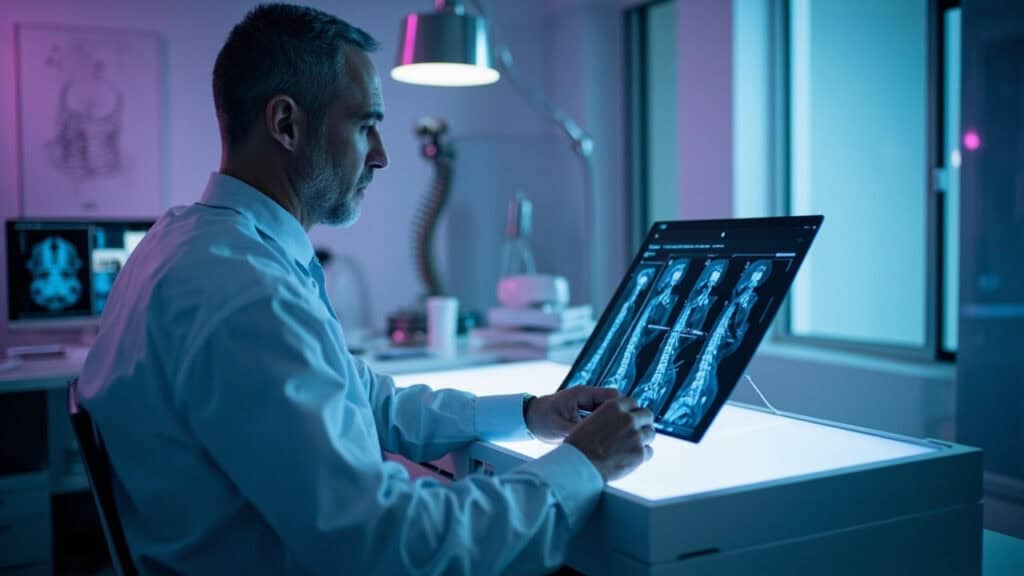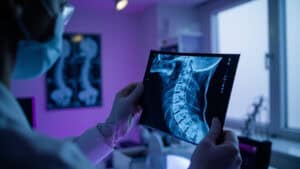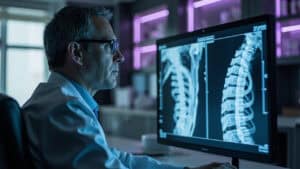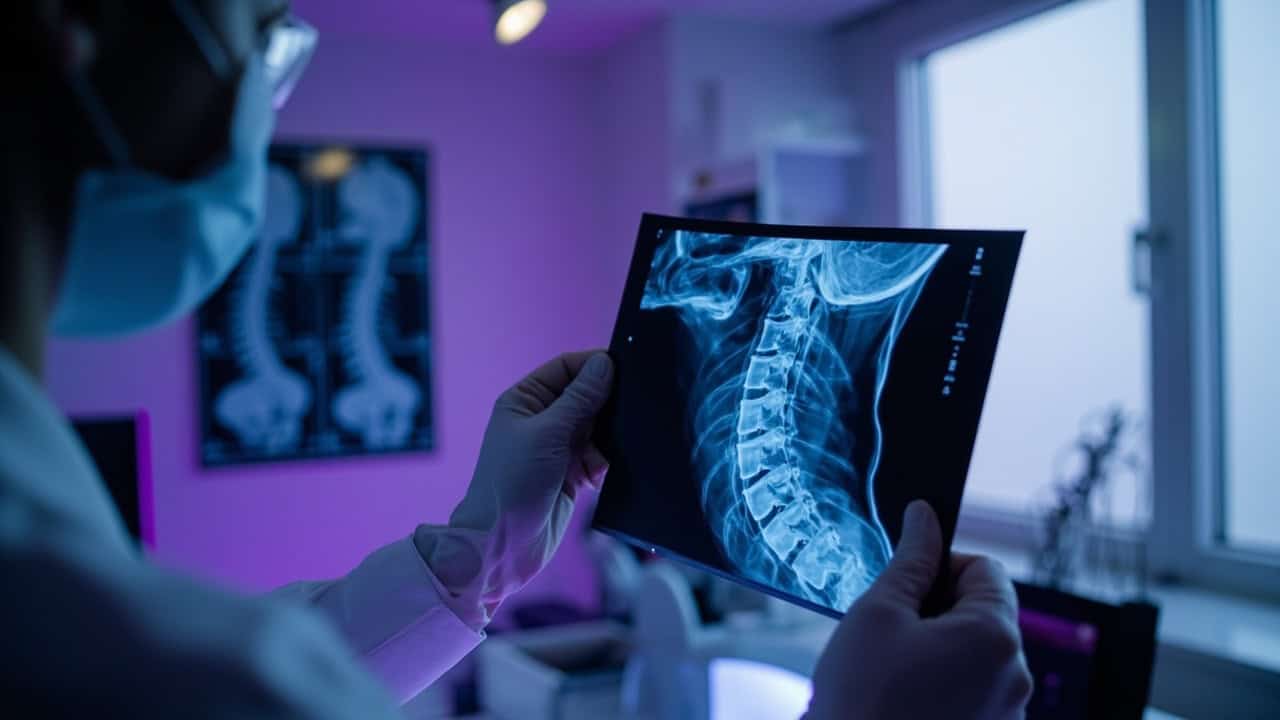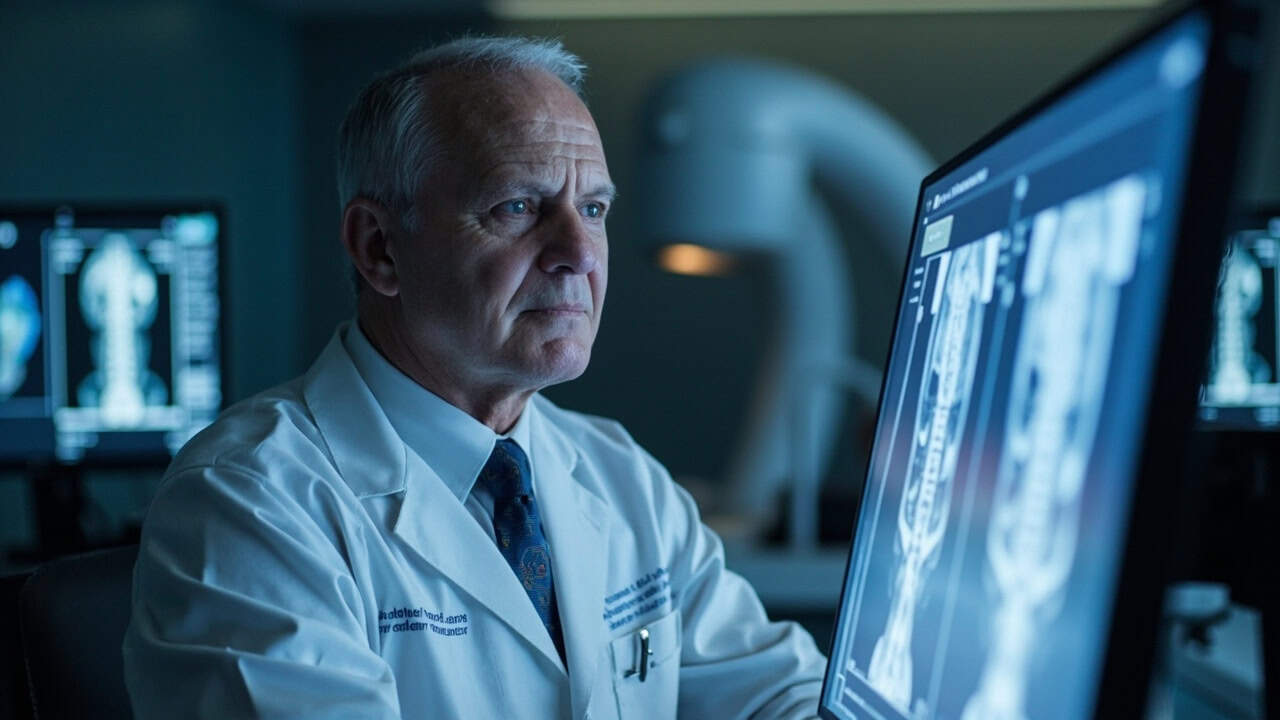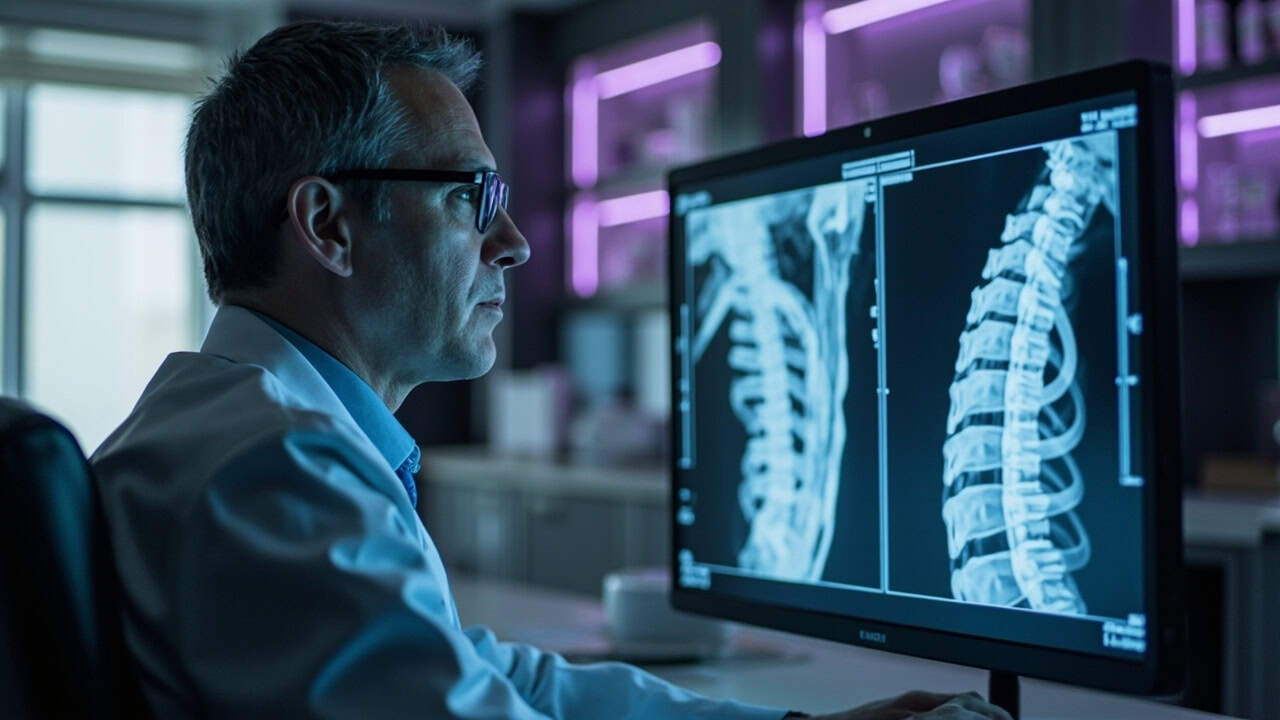Can A Spinal Tap Cause A Herniated Disc? A Physician’s Evidence-Based Approach
Written by Dr. Matthias Wiederholz, MD, Quadruple Board-Certified Spine Specialist
Quick Insights
A herniated disc occurs when the soft center of a spinal disc pushes through its tough exterior, commonly causing pain or nerve problems. Medical research shows spinal taps rarely cause herniated discs, though back pain may result from other factors. Accurate, evidence-based assessment is vital for safety.
Key Takeaways
- Most herniated discs result from natural aging or injury, not medical procedures.
- Spinal tap complications are rare and usually involve temporary discomfort, not structural disc injury.
- Symptoms like sharp pain or numbness after a spinal tap should be evaluated by a specialist promptly.
- New, non-surgical options like the Discseel® Procedure can help preserve mobility and active lifestyles.
Why It Matters
Understanding if a spinal tap can cause a herniated disc is crucial for anyone fearing loss of independence or daily activity. Addressing these worries early means you can protect your spine, minimize downtime, and return to the active, pain-free life you value most.
As a quadruple board-certified spine specialist and expert provider, I’ve seen how fears about procedures can weigh just as heavily as the discomfort itself.
Can a spinal tap cause a herniated disc? A spinal tap—also called a lumbar puncture—is a procedure where a needle is inserted into the lower back to collect spinal fluid. Many people worry that this could damage the discs, leading to serious pain or loss of mobility, especially for those wanting to maintain an active lifestyle in Houston, TX.
In my 20 years caring for patients with back pain, I have found that most herniated discs actually result from daily wear-and-tear, aging, or injuries—not medical procedures. Large-scale medical evidence confirms that spinal taps rarely cause new disc herniation, though temporary soreness is not uncommon.
If you’re worried about protecting your spine and staying active, let’s explore what the medical research truly reveals—and what you can do next. See Back Pain for more on managing pain in your back.
Quick Answer: Can A Spinal Tap Cause A Herniated Disc?
A spinal tap (lumbar puncture) does not typically cause a herniated disc. The needle is inserted well below the end of the spinal cord, intentionally avoiding the discs. Large clinical studies confirm that new disc herniation following lumbar puncture is extremely rare; most side effects are short-lived, like temporary back pain or headache. In fact, the risk of structural disc injury from this procedure is negligible compared to the natural risks such as aging, trauma, or repetitive strain.
| Question | Answer |
|---|---|
| Can a spinal tap cause a herniated disc? | No, not under normal circumstances. |
| Main risks | Temporary back pain, headache, and a very rare infection. |
| Research evidence | No direct link to disc herniation found in large studies. |
If you’re curious about symptoms and causes, explore L5-S1 Pain and Its Causes, Symptoms, and Treatment.
Understanding Spinal Tap (Lumbar Puncture)
A spinal tap, or lumbar puncture, is a procedure where a physician gently inserts a thin needle into your lower back—specifically into the spinal canal—to collect or test cerebrospinal fluid. Importantly, this is performed below the tip of the spinal cord, reducing the risk to both nerves and discs.
Why This Procedure Is Done
- Diagnose neurological infections (such as meningitis).
- Assess for conditions like multiple sclerosis.
- Measure and relieve excessive pressure around the brain and spinal cord.
As a quadruple board-certified specialist, I emphasize to patients that, done properly, the procedure is an essential—and safe—tool for diagnosis that does not involve the spinal discs themselves.
Risks and Complications
Typical short-term risks include:
- Mild back pain at the injection site.
- Headache due to temporary fluid shifts.
- Rarely, infection or bleeding at the puncture point.
Clinical Observation Statement:
In my practice, patients often worry about the impact of a spinal tap on long-term spine health. I reassure them that, with proper technique, lasting harm to the discs is exceedingly rare. Disc herniation is virtually unreported as a complication.
Further, learn about the Symptoms of a Bulging Disc in the Neck C5-C6 if you’re concerned about injuries from trauma or daily activities.
What Is a Herniated Disc?
A herniated disc occurs when the soft center (nucleus pulposus) of a spinal disc pushes through its tougher outer layer (annulus fibrosis). This can pinch or irritate nearby nerves, leading to symptoms like pain, numbness, or muscle weakness.
Common Causes
- Natural age-related degeneration and disc wear.
- Repetitive motions, heavy lifting, or frequent bending.
- Sudden injury or trauma.
Professional Assessment Phrase:
As a regenerative spine specialist, I see far more disc herniations from daily wear and tear or acute accidents than from any medical procedure. Research reinforces that the overwhelming majority of disc herniations result from internal breakdown—not external puncture or interventions.
The guide to spinal disc tears: Causes, symptoms, and treatment options outlines degeneration as the primary culprit, not lumbar punctures.
Symptoms
- Sharp or radiating pain in the back, buttocks, or limbs
- Tingling or numbness, often in legs or arms
- Muscle weakness or loss of coordination
It’s worth noting that not all herniated discs are symptomatic; some show up only on MRI or CT scans done for other reasons. Epidemiological studies report that many cases resolve with rest and rehabilitation alone.
Visit Disc Desiccation: Understanding the Causes, Symptoms, and Treatment for more about disc desiccation.
Can A Spinal Tap Cause A Herniated Disc? (What the Evidence Shows)
What Research Says
Rigorous studies continue to confirm: spinal taps do not cause disc herniation. The needle is designed to pass between, not through, the discs, and is inserted below the end of the spinal cord. Both practical guidelines and state-of-the-art imaging research reaffirm this, with no increase in herniated disc cases after lumbar puncture. Current guidelines and advanced imaging studies demonstrate the safety of the procedure.
Experience-Based Insight:
Having personally performed over 10,000 advanced spine procedures, I have yet to see a confirmed disc herniation caused by a properly executed spinal tap. The main risks are minor, temporary discomfort—never structural disc damage.
Confusions & Misconceptions
Many people assume that any back pain after a spinal tap means disc injury. In almost every instance, this pain is due to slight muscle irritation or tissue reaction—not disc herniation.
Comparative Expertise:
Unlike large hospital systems, where patient concerns may get lost, I take time to explain that true disc injuries from spinal taps are nearly unheard of when physicians follow best practices. This clarity goes a long way toward relieving unnecessary anxiety and enabling a confident, informed decision.
For more information about disc tear treatments, check Disc Tear Treatment: Restoring the Integrity of Your Spine.
Signs of Disc Injury After Spinal Tap
True disc herniation after a spinal tap is exceedingly rare, but it’s still important to recognize warning signs that warrant immediate medical attention:
- Persistent, severe back pain that does not improve.
- Numbness or weakness in your legs.
- Loss of bladder or bowel control (emergency).
In my clinic, I urge patients: if you experience these symptoms—especially after any back procedure—seek an expert spine evaluation quickly. While disc herniation is relatively uncommon, prompt action on significant symptoms may prevent longer-lasting issues.
When To Seek Medical Attention
Contact a physician—ideally a spine specialist—immediately if you develop:
- Sudden, unexplained leg weakness.
- Difficulty controlling bladder or bowels.
- Numbness in the groin or saddle area.
These may be signs of nerve compression and demand urgent evaluation. See S1 Nerve Root Compression – Symptoms, Diagnosis, and Treatment.
What To Do If You Have Symptoms
If you notice new or worsening symptoms following a spinal tap:
- Rest and gentle movement are encouraged.
- Over-the-counter anti-inflammatories may provide relief.
- Follow up with your provider to monitor progress.
Professional Assessment Phrase:
As a specialist, I follow strict national pathways: advanced imaging (like MRI) is reserved for cases where symptoms persist beyond six weeks, or “red flag” symptoms (like weakness or incontinence) are present. Diagnostic guidelines help us avoid unnecessary tests, but never delay urgent care.
Key Takeaway:
Most “back pain after spinal tap” symptoms resolve quickly without needing scans or interventions. But if pain is severe or accompanied by the warning signs above, don’t delay an evaluation.
Current Best Practices for Disc Injury
Conservative Treatments
Most herniated discs—and nearly all mild post-procedure back pain—improve without surgery. Standard non-surgical options include:
- Physical therapy to restore movement and strength.
- Anti-inflammatory medications (NSAIDs) to calm symptoms.
- Targeted activity modification to prevent aggravation.
Clinical Observation Statement:
I routinely see patients in Houston return to active routines with a personalized combination of therapy and guided exercise. Inflammation is a key part of early pain, and addressing it accelerates improvement. Recent studies advise focusing on inflammation for optimal outcomes.
Explore Treatments for Disc Desiccation for disc desiccation management.
When Surgery or Regenerative Treatment Is Considered
- Pain lasting beyond 6–12 weeks despite conservative care.
- Progressive neurological issues (worsening numbness, weakness).
- Loss of mobility or inability to return to normal activity.
Best outcomes occur when advanced treatments are assigned only after a clear, individualized assessment. Data from recent research show that minimally invasive solutions restore function—and reduce the risk of disability—far more reliably than outdated, aggressive surgeries. As a physician certified in non-surgical spine innovation, I prioritize precision-matched therapies for each patient’s unique needs.
Non-Surgical Innovations: The Discseel® Procedure
The Discseel® Procedure is a groundbreaking, outpatient solution designed to repair damaged spinal discs and promote natural regeneration—without the trauma of major surgery.
Visit the official Discseel® resource for a comprehensive overview.
What sets Discseel® apart?
- Uses a biologic fibrin sealant to “seal” tears in the disc, halting inflammation and stimulating healing.
- Preserves spinal mobility—no hardware, fusions, or general anesthesia required.
- Rapid return to activity: Recovery timelines after spinal procedures vary; some individuals may begin walking shortly after surgery, while resumption of normal activities depends on the specific procedure and individual circumstances.
Experience-Based Insight:
Having performed Discseel® for over a decade, and as one of only three certified master instructors in the world, I have seen firsthand how this non-surgical procedure transforms lives—especially for patients who have been told they need “open” surgery or live with pain.
Curious about prognosis? Read the Comprehensive Guide to L5-S1 Bulging Disc.
Benefits Over Surgery
- No incisions, screws, or general anesthesia.
- 82% long-term success rate
- Outpatient procedure—quick recovery.
- Direct repair of annular tears, the true root of many discogenic pain cases.
Professional Assessment Phrase:
As a quadruple board-certified spine specialist, I match the Discseel® Procedure to patients whose MRI and clinical findings demonstrate disc-related pain that hasn’t improved with therapy or injections. This focus on personalized, minimally invasive care is why so many active adults in Houston trust us with their recovery.
Procedure Overview
- Injection of fibrin sealant under X-ray guidance into the affected disc.
- No cutting or removal of bone or soft tissue.
- Local anesthesia—minimizing risk while maximizing patient comfort.
- Many individuals can begin walking within hours after a spinal procedure and may resume normal activities within a few days.
I personally perform every step, from diagnosis through recovery, ensuring compassionate, comprehensive care throughout your journey.
Learn more about Effective Treatment Options for L5-S1 Disc Herniation Pain.
Why Choose Dr. Matthias Wiederholz in Houston?
Credentials & Experience
As a quadruple board-certified physician, direct master instructor for Discseel®, and the first provider in Houston and New Jersey trained directly under Discseel’s inventor, Dr. Kevin Pauza, my commitment is to advanced, evidence-based spine restoration. With over 10,000 minimally invasive procedures performed, I offer world-class care usually unavailable outside large academic centers—here in a boutique, patient-focused setting.
What Makes Our Approach Different
- Personalized care: I oversee every detail, from diagnosis to rehabilitation.
- Fast access: Short wait times—and prompt, tailored treatment plans.
- Holistic focus: Recommendations include exercise, ergonomic advice, and lifestyle support for enduring spine health.
Comparative Expertise:
Unlike larger facilities where you may rarely see the same clinician twice, I take pride in knowing each patient’s story and guiding them every step of the way. Whether you’re a competitive athlete, busy parent, or mature adult, I am dedicated to restoring your function—and confidence—in the safest way possible.
“Dr. Wiederholz and staff are amazing. My lower back pain is now manageable, and I’m able to function better, thanks to them. They take the time to listen to your concerns and explain your options in detail. I highly recommend Dr. Wiederholz for anyone with back or joint issues!” — VyGoogle Review
What Our Patients Say on Google
Patient experiences are at the heart of my approach to spine care. Hearing directly from those I’ve helped provides valuable insight into what truly matters—trust, responsiveness, and skill.
I recently received feedback that captures what we aim to provide for every patient who walks through our doors. This reviewer shared:
“Dr. Wiederholz and his team have always been great since I stepped foot into their office. They are very responsive to messages and helpful. I trust Dr. W for my steroid shots and Discseel procedure, he is very skillful.” — Vy
You can read more Google reviews here.
Feedback like this reinforces my commitment to delivering evidence-based, compassionate care—especially for those concerned about procedures like spinal taps and their impact on spine health.
Spinal Tap and Herniated Disc Care in Houston, TX
Living in Houston, TX, means access to advanced spine care without the need to travel far from home. The city’s active lifestyle and diverse population often bring unique challenges when it comes to back pain and disc health.
As a Houston spine specialist, I see firsthand how our local climate, work environments, and recreational activities can influence both the risk of disc injury and the recovery process. Many patients here value quick recovery and a return to their routines, which is why minimally invasive options like the Discseel® Procedure are so important.
At Performance Pain and Sports Medicine, we’re dedicated to providing personalized, non-surgical solutions for Houston residents. If you’re in the Houston area and have concerns about spinal tap risks or herniated discs, I invite you to take the next step. Learn more about our Houston office.
See if you are a candidate for the Discseel® Procedure in Houston and experience the benefits of expert, locally accessible spine care. Contact us today for an appointment or to get started on your personalized spine recovery journey.
Conclusion
Can a spinal tap cause a herniated disc? Based on decades of research and my own clinical experience, the answer is no—spinal taps do not increase your risk of disc herniation. Most disc injuries result from natural degeneration or trauma, not medical procedures. If you’re in Houston, TX, and worried about your spine, know that advanced regenerative care, without invasive surgery, is available to help you stay active and pain-free.
As a quadruple board-certified spine specialist and master instructor for the Discseel® Procedure, I am dedicated to restoring your mobility and quality of life. If you’re ready to stop missing out on daily activities due to back pain, I invite you to see if you are a candidate for the Discseel® Procedure. Let’s restore your spine and reclaim your life.
This article is for educational purposes only and should not be used as a substitute for professional medical advice, diagnosis, or treatment. Always seek the advice of your physician or other qualified healthcare provider with any questions you may have regarding a medical condition or treatment options. Never disregard professional medical advice or delay in seeking it because of something you have read in this article.
Frequently Asked Questions
Can a spinal tap cause a herniated disc?
A spinal tap does not typically cause a herniated disc. The needle is inserted below the spinal cord and avoids the discs entirely. Most herniated discs are due to aging or injury, not medical procedures. Temporary back pain after a spinal tap is common, but true disc herniation from this procedure is extremely rare. Read more about herniated discs.
Where can I find non-surgical spine care in Houston, TX?
You can find advanced, non-surgical spine care—including the Discseel® Procedure—at my practice in Houston, TX. I offer prompt appointments, personalized evaluations, and minimally invasive treatments designed to help you return to your active lifestyle quickly and safely.
What should legal or insurance professionals know about a disc herniation after a lumbar puncture?
Disc herniation after lumbar puncture is exceedingly rare and not supported by current medical evidence. When evaluating claims, it’s important to distinguish between temporary post-procedure discomfort and true disc injury. Objective assessment and thorough documentation are essential for accurate case review. Visit the Common Causes of Annular Tear of Lumbar Disc for more details on disc injuries.

